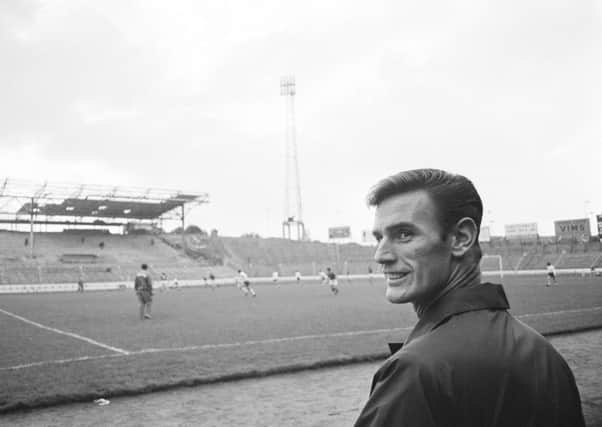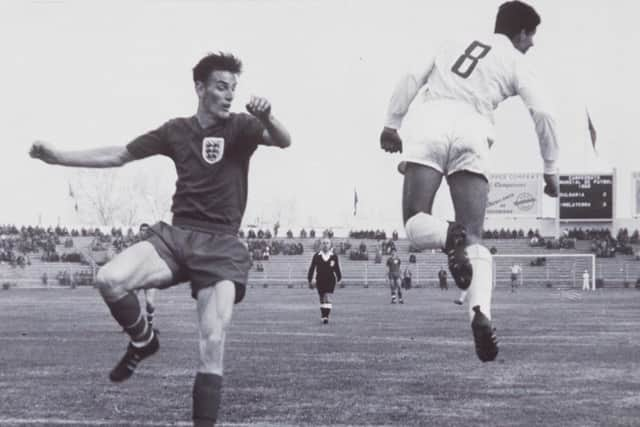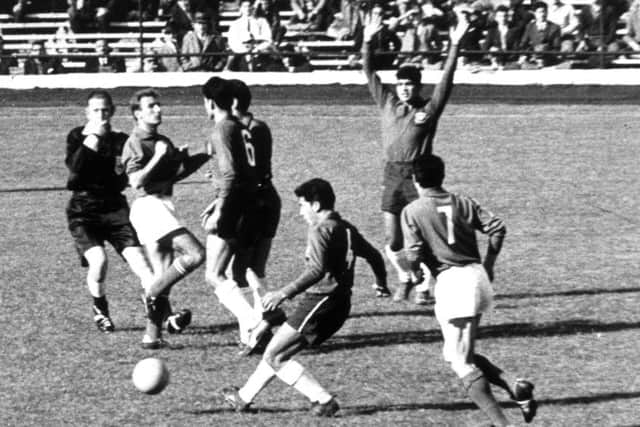Bygones: '˜Chile 1962 was like playing the World Cup in Whitby'


Or, failing that, how about the quarter-final tie when Jimmy Greaves, having crouched down on all fours to wrestle a canine invader to the ground, had the misfortune to become the first and only player in the tournament’s history to be urinated on by a dog?
For Alan Peacock, however, those finals in Chile are best remembered for the arduous travel arrangements and the miniscule crowds that watched England’s three group games in a rickety, little stadium.
Advertisement
Hide AdAdvertisement
Hide Ad“A bit like playing the World Cup in Whitby!” laughs the former Leeds United and Middlesbrough striker when looking back with The Yorkshire Post to those few weeks he spent in South America representing the Three Lions.
England, with Walter Winterbottom in charge at his fourth and final World Cup, headed across the Atlantic full of hope.
Qualification had been earned by eliminating a strong Portugal side and there was plenty of quality within the 23-man travelling party as the likes of Greaves, Bobby Robson and Johnny Haynes teamed up with future World Cup winners Bobby Charlton and Ray Wilson. Bobby Moore also made his international debut in the final warm-up game, a 4-0 win over Peru in Lima that saw Greaves net a hat-trick.
Peacock, fresh from scoring 24 times for Middlesbrough in the Second Division during the previous season, was just delighted to be part of the squad.
Advertisement
Hide AdAdvertisement
Hide Ad“Everything went for me at that time,” he recalls. “I was in good form, having no problems with injury and had scored some goals.


“The World Cup was certainly an experience and nothing like what they have nowadays. The travelling, in particular, was very different.
“I met Bobby Robson at Darlington station and then we caught the train to London together. Once at the airport, we all had to split up for the flight.
“I am not sure if that was down to not wanting all of us on the same plane for safety reasons or what but we were split into two groups.
Advertisement
Hide AdAdvertisement
Hide Ad“It was a normal charter flight to New York for our group. I had never been there and neither had any of the lads. So, despite us only being there for an hour or so before our next flight was due to leave, four of us decided to jump in a taxi and head into the city.


“We just wanted to see the place so told the taxi driver to take us round all the sights. We didn’t have time to get out at any of them but we managed to see New York for ourselves. He then took us straight back to the airport for our next flight. From there, we flew to Florida and then on again.”
Lessons had, at least, been learned from the 1958 World Cup. England had arrived in Sweden just two days before the tournament was due to start with no training camp lined up. Winterbottom then had to scout out suitable facilities, while his players kicked their heels back at the hotel.
Eight years earlier in Brazil and the ‘planning’, for want of a better word, had been even more lax with no provision made for the local food that proved to be too spicy for English tastes. On that occasion, Winterbottom had solved the problem by heading into the kitchen and cooking the meals himself.
Advertisement
Hide AdAdvertisement
Hide AdIn Chile, England’s group games were to be played in the little town of Rancagua. It had not been the organisers’ first choice but the devastating Valdivia earthquake that struck a couple of years before the tournament forced a change.
England’s training camp was in a tiny mountain village called Coya, around 8,000 feet above sea level and boasting only basic facilities. The players stayed in barrack-style huts, only accessible over a wooden bridge with a 500ft drop either side. Some huts also had a corrugated roof, meaning the chances of sleeping during a rain storm were slim to non-existent.
“There were three or four of us in each hut,” recalls Peacock. “There wasn’t a lot to do in the village, either. The entertainment each night was, basically, a bowling alley in a restaurant. A little boy would sit on the end of the alley, above the pins, and after each player had his turn, this lad would jump down and put them back up.”
Critics may say the tournament itself was similarly lacking in entertainment, the 1962 finals long since having become renowned in football folklore as the dirtiest of all time. The ‘Battle of Santiago’ clash was the lawless lowpoint, as David Coleman made clear when famously introducing the highlights on the BBC a couple of days later with the words: “The game you are about to see is the most stupid, appalling, disgusting and disgraceful exhibition of football in the history of the game.”
Advertisement
Hide AdAdvertisement
Hide AdBut this free-for-all involving Italy and Chile was far from the exception with the opening two days of the World Cup bringing four red cards, three broken legs, a fractured ankle and a smattering of cracked ribs.
Matters barely improved after such an inauspicious start with the referee forced to call the two captains together during the semi-final between Czechoslovakia and Yugoslavia in an attempt to prevent a full-scale brawl.
Two red cards were also shown in the other last-four clash between the hosts and Brazil. As for England, their matches were relatively free of violence. Only one of that quartet, however, was won, the second group game against Argentina that brought Peacock his international debut.
Having lost 2-1 to Hungary in front of a paltry 7,938 crowd two days earlier, the Three Lions badly needed to take both points. Peacock helped them do just that, his goalbound header bringing a blatant handball from Ruben Navarro that Ron Flowers punished from the penalty spot.
Advertisement
Hide AdAdvertisement
Hide AdCharlton and then Greaves completed a 3-1 win that, thanks to a goalless bore draw against Bulgaria in the final group game, sent England through at Argentina’s expense.
Brazil awaited in the quarters and even though Pele was injured, Winterbottom’s men were well beaten on an afternoon when Greaves found himself the unwitting victim of a soaking from a pitch-invading dog.
“I was really upset to miss Brazil through injury,” added the striker, who moved to Elland Road in 1964. “I had just got in the team and done well in the games against Argentina and Bulgaria.
“Unfortunately, I pulled something in my thigh so couldn’t play. I sat on the bench. Literally, a bench, too, as the facilities were quite basic.
Advertisement
Hide AdAdvertisement
Hide Ad“The team lost and we were on our way home straight away, same route as before via Florida and New York before flying back into London. And that was that for me in the World Cup. I missed out in 1966 through injury, even though Sir Alf (Ramsey) gave me as long as possible to prove my fitness.”
Peacock’s misfortune was Geoff Hurst’s gain and the rest, as the phrase goes, is history. Not that the Middlesbrough-born 80-year-old has any regrets.
“I played in a World Cup for England and that is a special thing,” he adds. “I also got to travel the world. Mind, we didn’t see much of it. We didn’t. It was training, matches, training and nothing else. I always say I went to loads of places as a footballer but never saw any of them.”